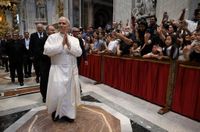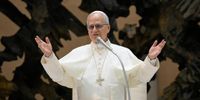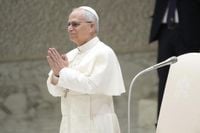Pope Leo XIV has once again placed the pursuit of peace at the very heart of his papacy, issuing a global call for prayer and fasting on Friday, August 22, 2025—the feast of the Queenship of the Blessed Virgin Mary. This urgent appeal, delivered during his weekly general audience on August 20, comes as wars continue to rage in the Holy Land, Ukraine, and other troubled corners of the world, leaving millions in anguish and uncertainty.
Standing before thousands in the Vatican’s Paul VI Audience Hall, the 69-year-old pontiff did not mince words. “Mary is the Mother of believers here on earth, and is also invoked as Queen of Peace, while our earth continues to be wounded by wars in the Holy Land, in Ukraine, and in many other regions of the world,” Pope Leo declared, as reported by NBC 5Chicago and Substack’s Gary Gately. He invited “all the faithful to devote the day of 22 August to fasting and prayer, imploring the Lord to grant us peace and justice, and to dry the tears of those who suffer as a result of the ongoing armed conflicts.” His prayer was direct and heartfelt: “Mary, Queen of Peace, intercede so that peoples may find the path to peace.”
This latest call for peace and reconciliation is hardly a new refrain for Leo XIV, who has made these themes a leitmotif of his young papacy since his election on May 8, 2025. His very first words from the loggia above St. Peter’s Basilica were, “Peace be with all of you!”—a blessing that has echoed through his speeches and actions ever since. According to NBC 5Chicago, Leo’s brother John called him “a pope of the people,” a sentiment that seems to resonate with the faithful, particularly the youth. Earlier this month, a million young people gathered at Rome’s Tor Vergata Park for a jubilee Mass, where Leo urged them to cultivate sincere hearts and seek renewal through self-giving love. “We are not made for a life where everything is taken for granted and static,” he told the crowd, “but for an existence that is constantly renewed through gift of self in love.”
Leo’s emphasis on the heart and forgiveness draws deeply from his spiritual heritage. In a recent catechesis, he reflected on John’s Gospel account of the Last Supper, focusing on the poignant moment when Christ offers a morsel of food to Judas Iscariot, the traitor. “This passage strikes us,” Leo said, “as if evil, hidden until then, manifested itself after love showed its most defenseless face.” He described the act as “love’s last attempt not to give up,” even in the face of rejection. Leo continued, “It is here that forgiveness reveals all its power and manifests the true face of hope. It is not forgetfulness; it is not weakness. Jesus’s love does not deny the truth of pain, but it does not allow evil to have the last word.”
This message of hope and resilience in the face of suffering is particularly poignant given the current state of global affairs. On August 19, during an impromptu press conference at the papal retreat in Castel Gandolfo, Leo expressed cautious optimism about negotiations to end Russia’s war on Ukraine. These talks followed a high-profile meeting at the White House between President Donald J. Trump, Ukrainian President Volodymyr Zelenskyy, and other European leaders. “But we still need to work hard, pray hard and truly seek the way forward, to find peace,” Leo said, as reported by Substack. He also called for the peaceful resolution of conflicts in Ukraine and Gaza, emphasizing the need for dialogue and diplomacy over violence and weapons. “We must always seek a ceasefire; the violence, the many deaths must stop. Let’s see how they can reach an agreement. Because after all this time, what is the purpose of war? We must always rely on dialogue, on diplomatic work, and not on violence or weapons.”
Leo’s concern for Gaza was especially urgent. In his first public remarks on the humanitarian crisis there since Israel’s controversial plans to take over Gaza City, he stated, “The humanitarian crisis must be resolved. We cannot go on like this.” He urged that while Hamas must free the remaining Israeli hostages, “we must also think of the many who are dying of hunger” in Gaza. He voiced deep worry that more than two million Palestinians could be forced out of the territory, a scenario that would only deepen the suffering.
The grim reality in Gaza is underscored by reports from the United Nations and more than 20 aid organizations, which have warned that famine and malnutrition have reached unprecedented levels since the war began on October 7, 2023. Gaza’s Health Ministry estimates that more than 62,000 Palestinians, including nearly 18,000 children, have been killed in the conflict as of August 2025. Starvation and malnutrition are rampant; the UN says more than one in three Gazans go days without food, and 20,000 children have been treated for acute malnutrition since April. The Gaza Health Ministry reported at least 266 hunger-related deaths, including 122 children, just this week.
On the political front, the situation remains volatile. On August 20, Israel announced it was calling up 60,000 reservists and launching the first phase of its takeover of Gaza City, nearly doubling its active reservists to 120,000. The move came despite a 60-day ceasefire plan proposed by Qatari and Egyptian mediators, which called for the release of Israeli hostages in exchange for Palestinian prisoners. Hamas, which initially expressed support for the proposal, condemned Israel’s actions as a “blatant disregard for the efforts made by the mediators.”
The international community is deeply divided. At an August 10 UN Security Council meeting, only the U.S. and Israel defended Prime Minister Benjamin Netanyahu’s military plans, with U.S. Ambassador Dorothy Shea insisting, “The international community must stop pressuring Israel and instead impose maximum pressure on Hamas to immediately release all 50 hostages that they continue to hold captive.” Meanwhile, Amnesty International and other organizations have accused Israel of “carrying out a deliberate campaign of starvation in the occupied Gaza Strip, systematically destroying the health, well-being and social fabric of Palestinian life.”
Tensions escalated further when the Trump administration imposed sanctions on four members of the International Criminal Court (ICC), including judges who authorized arrest warrants for Netanyahu and former Israeli Defense Minister Yoav Gallant over alleged war crimes in Gaza. The ICC condemned the move as “a flagrant attack against the independence of an impartial judicial institution,” and France demanded the U.S. withdraw all sanctions against ICC officials. U.S. Secretary of State Marco Rubio defended the sanctions, calling the ICC “a national security threat that has been an instrument for lawfare against the United States and our close ally Israel.”
Amid this global turmoil, Pope Leo XIV’s call for prayer and fasting stands out as a plea for unity and compassion. His consistent message—that peace is built “in the heart and from the heart, by eliminating pride and vindictiveness and carefully choosing our words”—offers a counterpoint to the seemingly endless cycle of violence and retaliation. As he prepares to declare St. John Henry Newman a Doctor of the Church, Leo continues to draw on the wisdom of those who have gone before, urging the world to let “heart speak unto heart.”
In a world battered by conflict and division, Leo XIV’s appeal is both a challenge and an invitation: to believe that peace is possible, and to take concrete steps—however small—toward making it a reality.



